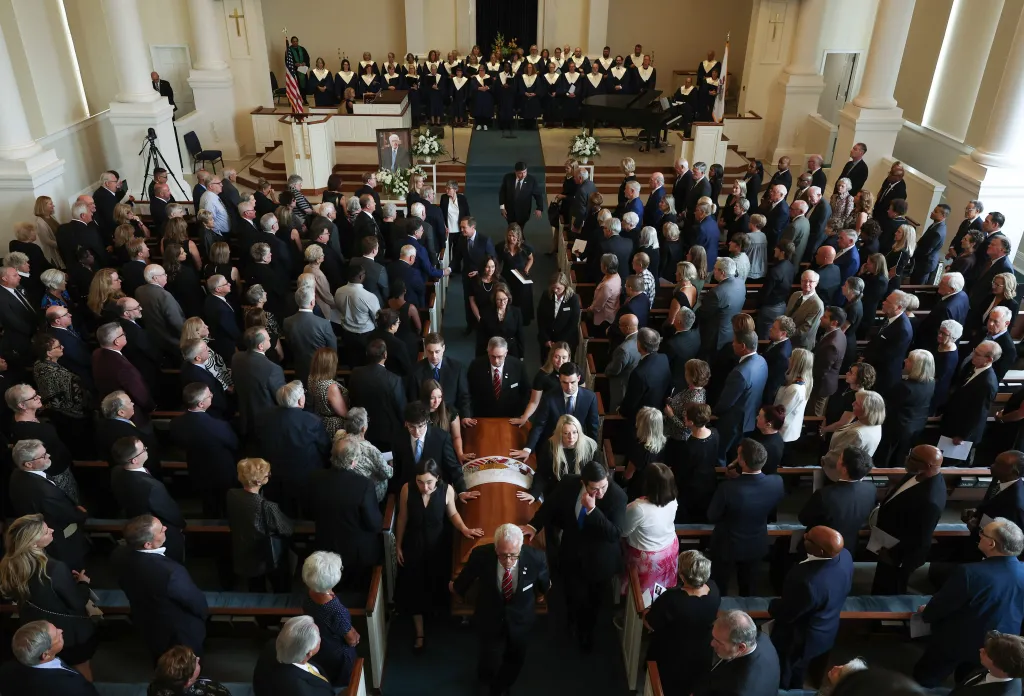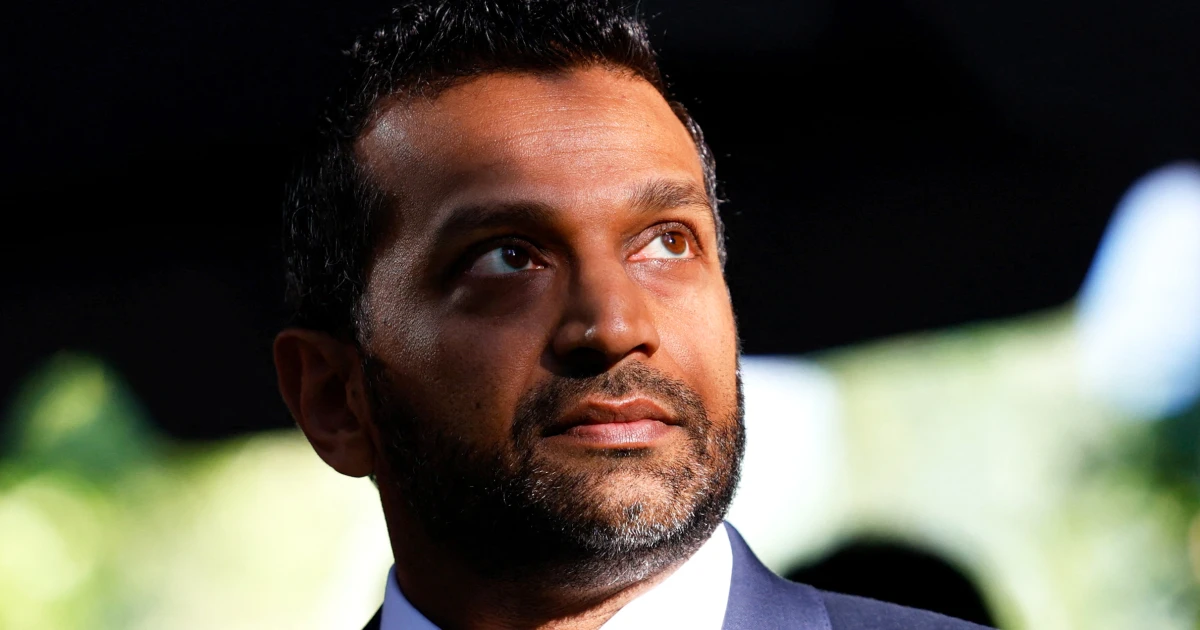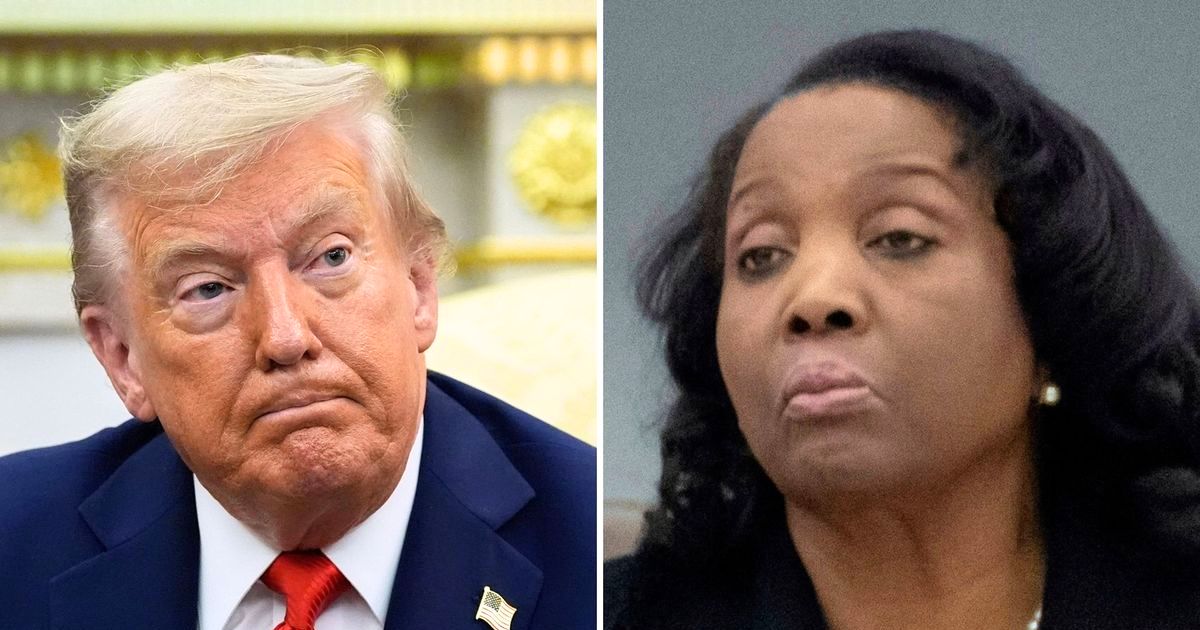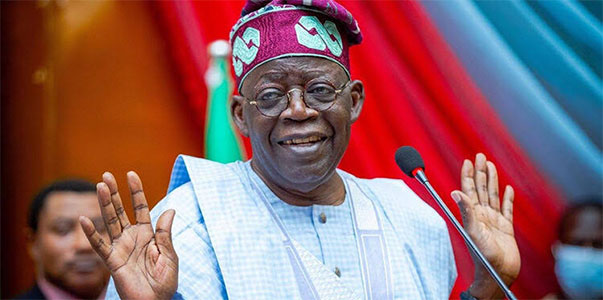
SPRINGFIELD — The late former Gov. Jim Edgar was memorialized Saturday as a man whose compassion, integrity, and honesty showed he put people above politics and led Illinois as a model of what competent governance used to be — and should be — especially during today’s sharply partisan and divided times.
Edgar, a Republican who served two terms as the state’s 38th governor from 1991 to 1999 and a decade before that as secretary of state, died Sept. 14, after having an adverse reaction to treatment for the pancreatic cancer he was diagnosed with in January. He was 79.
A bipartisan audience of more than 300 family, friends, former staff and agency directors, as well as past and current public officials, gathered Saturday at Central Baptist Church in the state’s capital to celebrate Edgar’s life, to remember his service to Illinois and to grieve his passing.
Democratic Gov. JB Pritzker, who consulted Edgar for advice, said the former governor’s “values and judgment and service have been a model to follow” and called the former governor “an icon of Illinois.”
“Jim Edgar believed deeply in our individual and our collective responsibility to one another — that regardless of where we live, what we look like or who we voted for, our foremost obligation is to serve one another. That is how he governed,” Pritzker said.
“As governor, Jim was a steady hand and a comforting, calming presence for our state. Through times of crisis, he could walk into a room of people he disagreed with, hold on to his strong views and still listen and learn with a full heart. All of these characteristics, so inherently Illinois, made Jim a force for unity, with a unique ability to bring people together despite their differences. These are lessons that I think all of us could use right now,” he said.
Pritzker added that “earnestness, honesty, unwavering loyalty to the people he served have made Jim Edgar an icon of the great state of Illinois, no matter what party we belong to. His impact is incalculable, and it changed our state for the better.”
Rev. Dr. Kent Lolling of Laurel United Methodist Church, who officiated the memorial ceremony, said Edgar had specifically requested Pritzker offer remarks at his funeral because “he believed it was important to show that bipartisanship still matters, that it still lives in Illinois and in America.”
Felicia Norwood, a health care executive who served as a senior adviser to Edgar on health and human service issues, noted that among a diverse staff with “strong personalities and sometimes stronger egos, he thrived and always put the people of Illinois first.”
“From the governor, I learned that politics done right is about service, not about power; that you can disagree and still have respect for others within the party and on the other side of the aisle; that listening is an essential ingredient in learning, and that hearing people out even when the answer to their request was going to be no, and we said no often, was respectful, valued and leads to longterm relationships,” Norwood said.
Norwood added that Edgar “was in public life for all the right reasons. He cared deeply about this state, and he never lost sight of the human faces behind the decisions he made.”
Ray LaHood, a former Republican congressman from Peoria who went on to serve as transportation secretary of Democratic President Barack Obama, said Edgar had served as a mentor to many.
He said the late former governor’s lasting legacy was the Edgar Fellows program, which Edgar created with the University of Illinois after he left office, in which a bipartisan group of 40 to 50 future leaders is chosen each year to meet and discuss public policy.
“For all the legacies of Jim Edgar, the fellows will be his legacy, a legacy teaching honesty and integrity, teaching the values that all of us know are very, very important,” LaHood said.
Dignitaries in the audience included LaHood’s son, Darin, a GOP congressman from Peoria, former Democratic Gov. Pat Quinn, former White House chief of staff and U.S. Commerce Secretary Bill Daley, and Jayne Thompson, the widow of Edgar’s predecessor as governor, James R. Thompson.
Edgar’s motto of following the “3 C’s:” civility, compromise and compassion, played heavily into the speakers’ remarks Saturday, as did the former governor’s role as a husband, father and grandfather.
The governor and his wife, Brenda, were married for 58 years.
“Mom’s kindness and compassion combined with dad’s determination and drive made them a dynamic duo,” said their daughter, Elizabeth. “Brenda Edgar, who might be described as a saint by some, provided consistent support, companionship and honest feedback, which allowed for and enhanced dad’s success.”
The Saturday service followed ceremonies at the Illinois State Capitol on Friday, in which Edgar was lying in state in the building’s rotunda. Several hundred people attended and signed a guestbook.
He was only the fourth governor to be accorded the rare honor.
The other governors were Adlai Stevenson, who served from 1949 to 1953, was a two-time Democratic presidential nominee and a U.S. ambassador to the United Nations, in July of 1965; Shelby Moore Cullom, who served from 1887 to 1883 and went on to become a congressman and U.S. senator, in February 1914, and John Tanner, who served from 1887 to1901, in May of 1901.
Edgar provided the template for electing a Republican statewide, combining the traits of social moderation and fiscal conservatism — a strategy GOP candidates have eschewed in recent times as the party moved further rightward.
Edgar had high public favorability ratings and was considered a favorite if he had sought a third term in 1998. Republican leaders tried to entice him to make a return to public office or to take on leadership positions with the party, but he demurred.
In recent years, Edgar abhorred what the Republican Party had become under President Donald Trump’s leadership and the GOP’s subservience to Trump.
Reflecting the change in times, Kathy Salvi, who chairs the state Republican Party, made no mention of the passing of the state’s last two-term GOP governor and the state’s last downstate chief executive in her weekly email newsletter.



